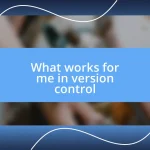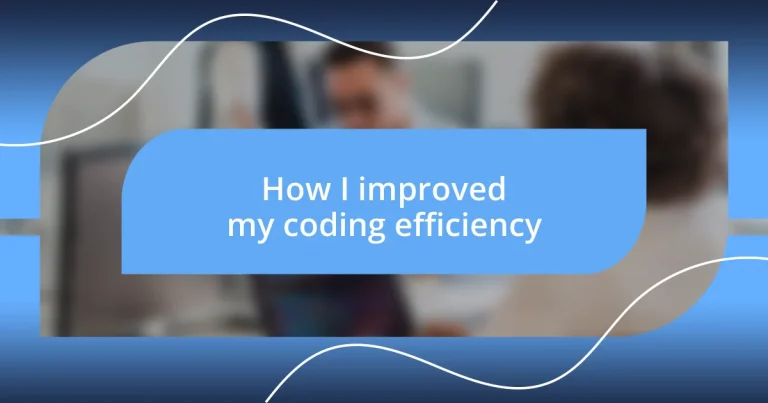Key takeaways:
- Improving coding efficiency involves adopting best practices, using tools like version control, and optimizing workflows to enhance productivity.
- Setting realistic and achievable goals helps maintain motivation and direction while breaking down complex projects into manageable tasks.
- Engaging with coding communities and tracking progress fosters growth, learning, and the opportunity to refine skills through collaboration and reflection.
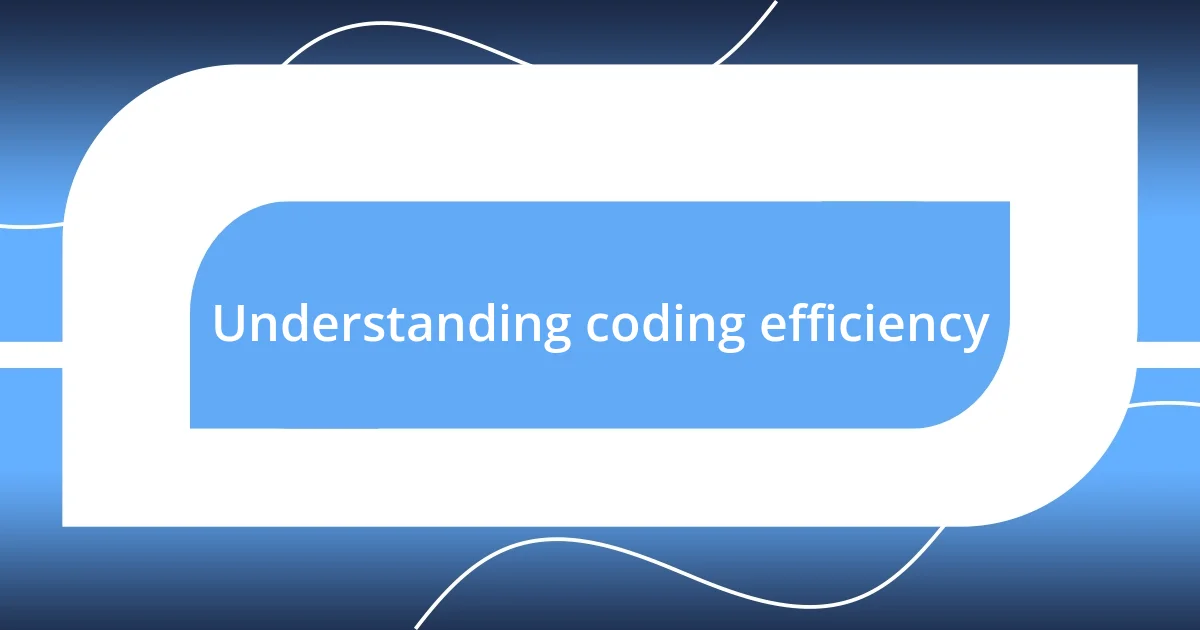
Understanding coding efficiency
When I first ventured into coding, the concept of efficiency seemed elusive. I often caught myself getting bogged down in details, losing valuable time debugging simple mistakes. Have you ever spent hours on a problem, only to realize it was a typo? It’s frustrating but highlights the importance of being efficient with our coding practices.
Over time, I learned that coding efficiency isn’t just about writing fewer lines of code; it’s about optimizing my workflow. I started using tools like version control and automation to streamline my processes. Have you ever thought about how much time you could save by automating repetitive tasks? It’s eye-opening to consider how small changes can lead to significant improvements.
I find that understanding coding efficiency also involves being mindful of how I organize my projects. Clear naming conventions and structured directories can save a lot of time when I revisit a project after weeks or months. Reflecting on my journey, I realize that adopting best practices and embracing efficiency not only boosted my productivity but also made coding a more enjoyable experience.
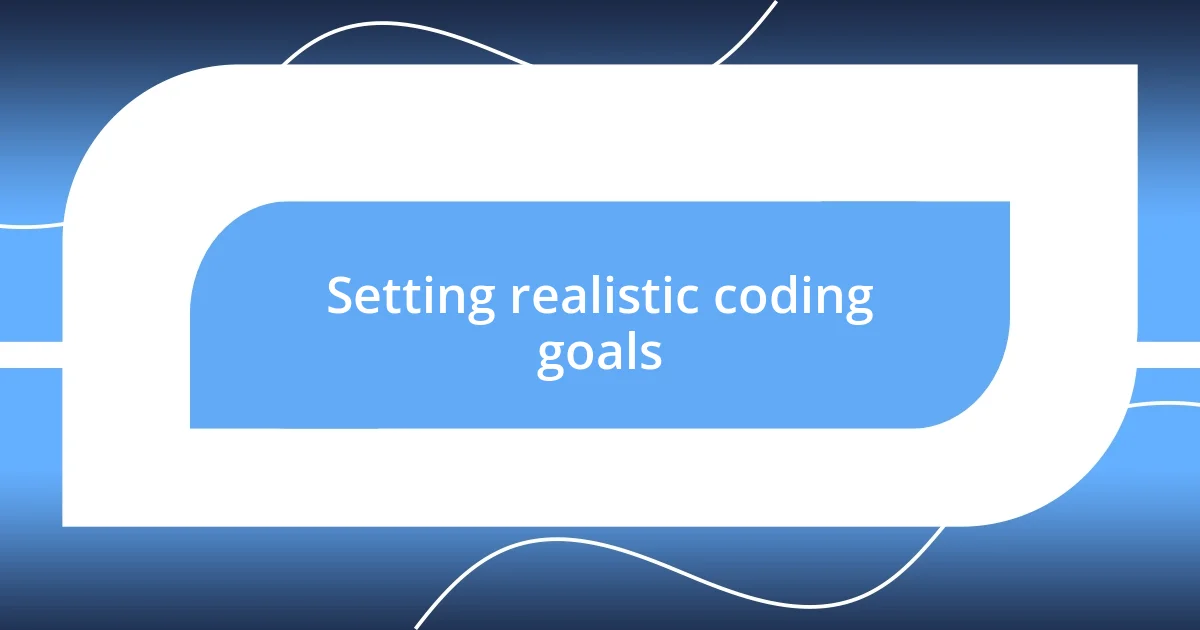
Setting realistic coding goals
Setting realistic coding goals has been a game-changer for me. Initially, I would jump headfirst into complex projects without a clear sense of direction, leaving me overwhelmed and frustrated. It took a few humbling experiences to understand the importance of setting achievable milestones. Now, I focus on breaking down larger tasks into smaller, manageable objectives. This not only keeps me motivated but also provides a clear path forward.
Here are some strategies I’ve found helpful in setting realistic coding goals:
- Define specific outcomes: I ensure that my goals are clear and measurable. For instance, instead of aiming to ‘learn Python,’ I might set a goal to ‘complete 10 coding challenges on LeetCode within a month.’
- Set time limits: I allocate a specific timeframe for each goal. This creates a healthy sense of urgency without overwhelming me.
- Be flexible: Sometimes life happens. I’ve learned to adjust my goals as needed rather than forcing myself to stick rigidly to a plan, which can lead to burnout.
I’ve noticed that celebrating the small wins, like fixing a bug or completing a module, fuels my enthusiasm and reinforces my progress. It’s a small victory, but it gives me the boost I need to tackle the next challenge.
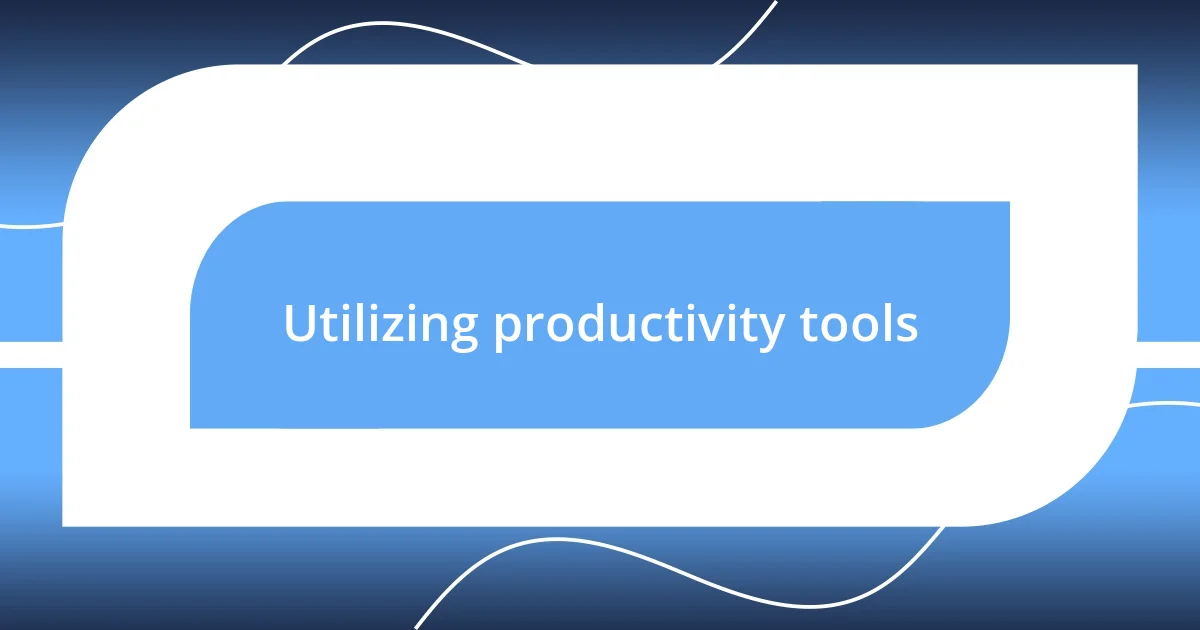
Utilizing productivity tools
Utilizing productivity tools has revolutionized my coding workflow. I remember the days when I juggled multiple files, losing track of changes, which often led to confusion and frustration. When I integrated tools like Git, my version control became seamless, enabling me to keep my files organized and track changes effortlessly. I can’t stress enough how much less anxiety I feel knowing I can revert to previous versions with a simple command.
In addition to version control, I discovered task management applications such as Trello and Asana. These tools help me prioritize coding tasks effectively. I vividly recall one project where I was working on tight deadlines; using Trello helped me visualize my workflow, ensuring I never overlooked a crucial step. It’s astonishing how a clear layout of tasks can empower me to stay focused and complete projects on time, making coding feel less like a scramble and more like a structured challenge.
I also find my coding sessions more productive with distraction blockers. Tools like Cold Turkey allow me to silence Notifications from social media and emails during intense coding periods. I’ve experienced that moment when every ping pulls me away from a flow state—oh, how irritating! Implementing these tools has turned my coding environment into a distraction-free zone. This approach has been incredibly liberating, as I can dive deeper into my work without interruptions.
| Tool | Purpose |
|---|---|
| Git | Version control to track changes |
| Trello | Visual task management for prioritizing coding tasks |
| Cold Turkey | Distraction blocker for maintaining focus |
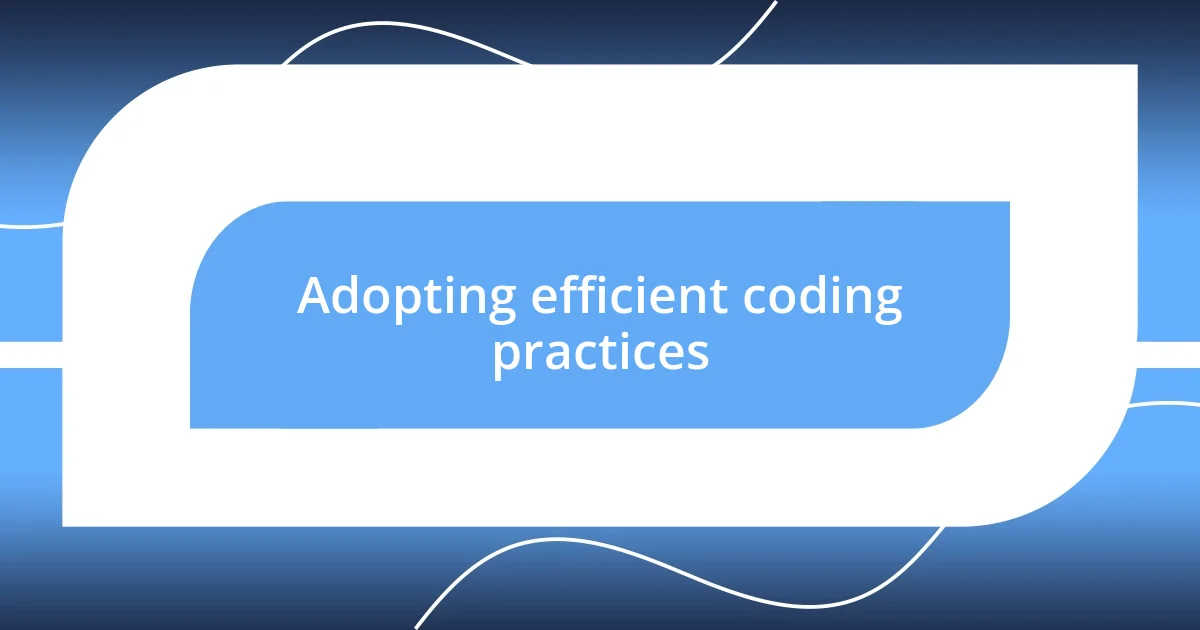
Adopting efficient coding practices
Adopting efficient coding practices truly transformed the way I approached development. I recall a time when my code was riddled with redundancy, and I often found myself rewriting the same functions over and over. By embracing the DRY principle—”Don’t Repeat Yourself”—I started writing modular code, which significantly reduced errors and saved me a ton of time. Isn’t it amazing how a simple shift in mindset can lead to such a sharp improvement in efficiency?
Another practice that really stood out for me was the use of consistent naming conventions. Initially, I’d throw together variable names that made sense to me at the moment, but later, trying to decipher my own code felt like decoding hieroglyphics. Now, I strive for clarity and consistency, naming variables and functions in a way that describes their purpose. This not only makes my code more readable for others but also helps me when revisiting old projects. Do you ever find yourself puzzled by your past work? I certainly have!
Finally, I can’t understate the power of regular code reviews. At first, I was a bit apprehensive about sharing my code with others, fearing criticism. But, as I began participating in peer reviews, I realized that constructive feedback refined my skills and opened my eyes to different approaches. It’s like having an extra set of eyes on your work—there’s a wealth of knowledge to gain from collaborative coding. Have you ever experienced that “aha!” moment during a review? I know I have, and it’s one of the best feelings to come from refining coding practices!
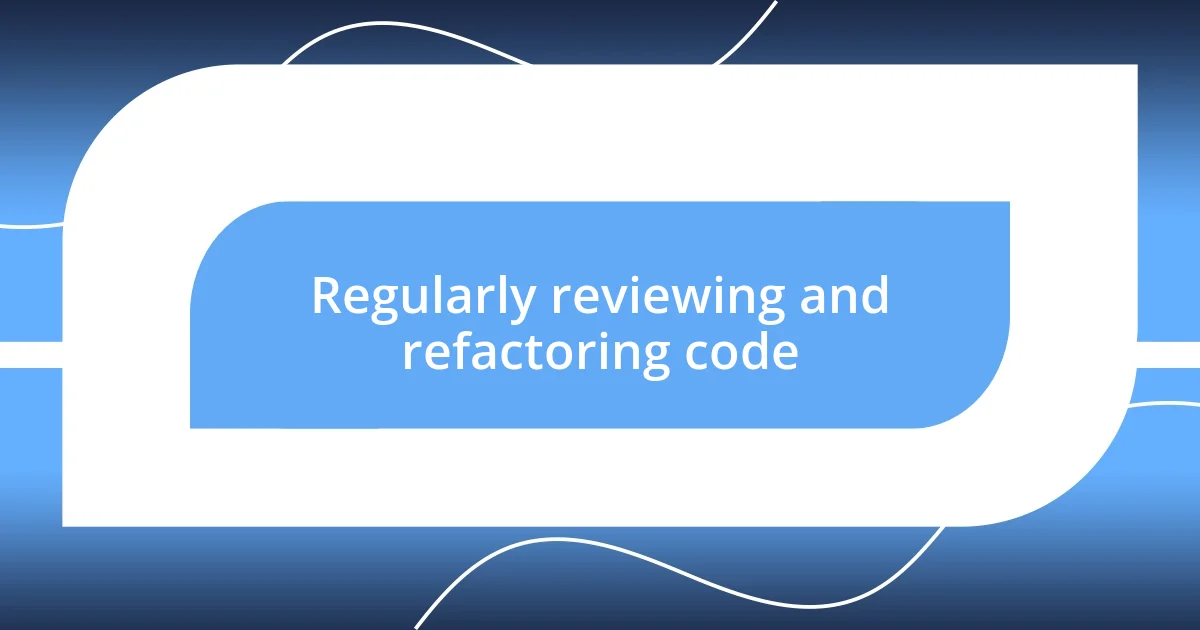
Regularly reviewing and refactoring code
Regularly reviewing and refactoring my code has played a critical role in my development journey. There were times when I’d finish a project, only to return weeks later to face a maze of tangled logic and outdated functions. I felt like I was standing in a crowded room, struggling to find a familiar face. By implementing scheduled reviews, I’ve learned to clear away the clutter and make my code more elegant. Hasn’t it ever struck you how refreshing it is to see your work in a new light?
Refactoring goes beyond just tidying up; it offers an opportunity for creativity. I remember tackling a particularly cumbersome project where the initial approach felt like trying to fit a square peg into a round hole. Instead of forcing it, I took a step back and reimagined the structure. The satisfaction of seeing a cleaner, more efficient solution unfold invigorated my passion for coding. It felt like creating a masterpiece from chaos, and I had to marvel at how much more efficient the final product was.
I also find that regular reviews promote a culture of learning. Each time I examine my code, I can’t help but uncover something new—be it a better method or a more efficient way to handle the logic. Reflecting on past mistakes not only sharpens my skills but also fosters a sense of growth. Have you ever noticed how that moment of realization—seeing a mistake vividly—can motivate you to strive for excellence? It’s a powerful reminder that every piece of code is an opportunity for improvement and learning.
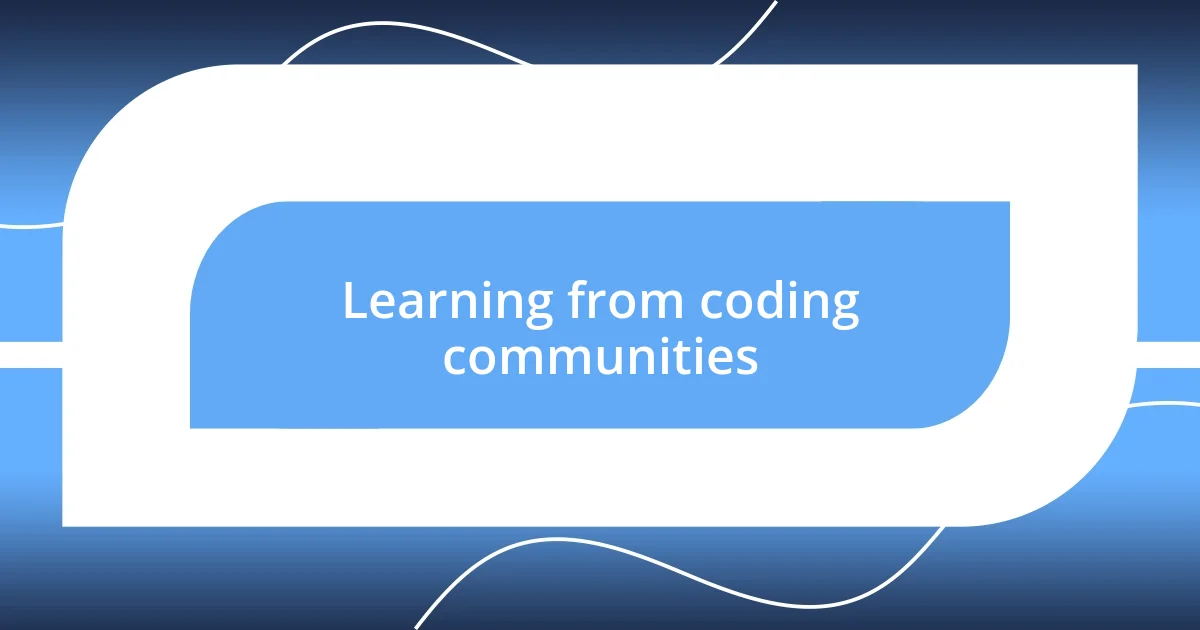
Learning from coding communities
Being part of coding communities has profoundly impacted my development abilities. I remember my first experience in an online coding forum where I hesitantly posted a piece of code I was struggling with. To my relief, other members not only offered solutions but shared their approaches, sparking ideas I hadn’t considered. Isn’t it incredible how a simple question can open doors to a world of collaboration and support?
Engaging with these communities has also provided me with a wealth of resources and insights beyond the conventional. I recall a time when I was grappling with debugging a tricky algorithm. A member shared a video tutorial that broke down complex concepts in a way that clicked for me. That moment illuminated how diverse tools and perspectives can tackle the same problem. Have you ever discovered a resource that revolutionized your understanding? It’s such a rewarding feeling to find that missing piece.
Moreover, seeing the various coding styles and practices from others is like participating in a constant masterclass. There was a period when I found myself stuck in a rut, using the same patterns without exploring alternatives. After observing different coding techniques shared in the community, I felt encouraged to experiment. This exposure has taught me that coding is not just about following a recipe but about creativity and evolution. Have you experienced that burst of inspiration after seeing someone else’s work? I certainly have, and it’s a reminder that there is always room to grow and innovate in our coding journeys.
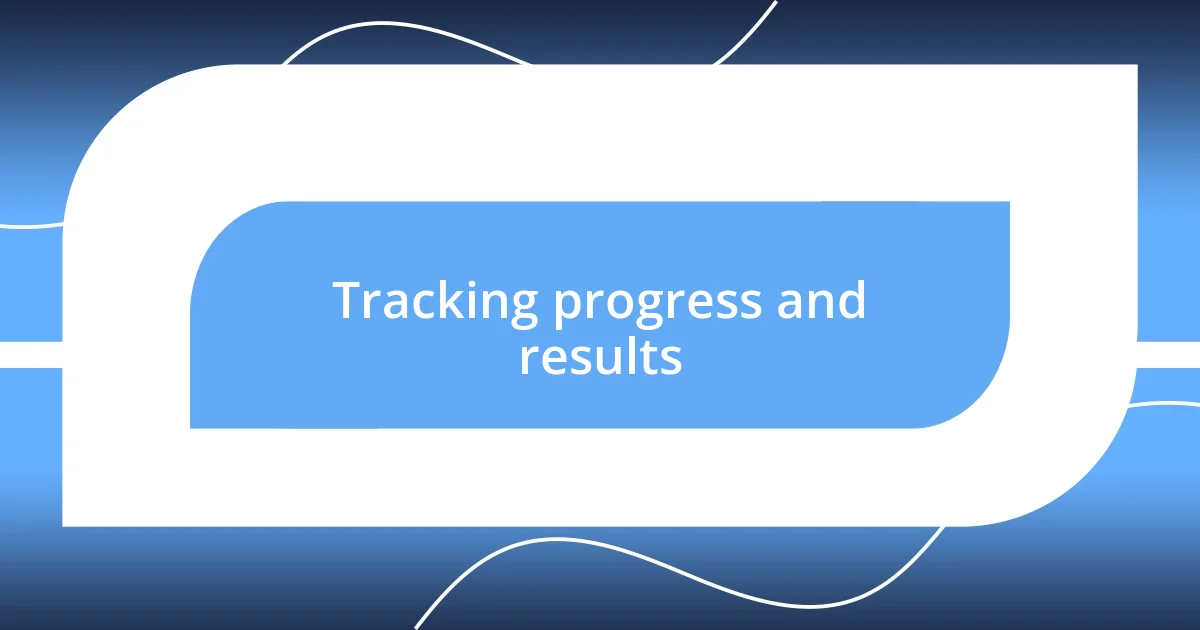
Tracking progress and results
Tracking my progress has been a game changer in boosting my coding efficiency. For instance, I started maintaining a detailed log of every coding session, noting the challenges I faced and the solutions I discovered. Looking back at these entries can be astonishing; it’s like diving into a time capsule of my growth. Have you ever paused to reread your own notes? Each line tells a story of perseverance and learning that shapes who I am as a developer.
In addition, I have found that measuring my results allows me to see tangible improvement over time. I recall when I set a goal to complete five coding challenges each week. It was a tough commitment, but tracking my completion felt rewarding. Each tick on the checklist fueled my motivation and highlighted my ability to tackle increasingly complex problems. Ever experience that rush of accomplishment when you finish a task you once thought daunting? It’s those small victories that keep the momentum going.
Lastly, revisiting my progress regularly has unveiled trends in my learning. By analyzing my log, I noticed I often struggled with recursion. Realizing this, I dedicated extra time to it, using resources I discovered in coding communities. The sense of purpose that came from focusing on my weaknesses transformed them into strengths. Isn’t it incredible how awareness can shift your approach? Now, I face recursion with confidence, and that, for me, is the beauty of tracking my coding journey.
